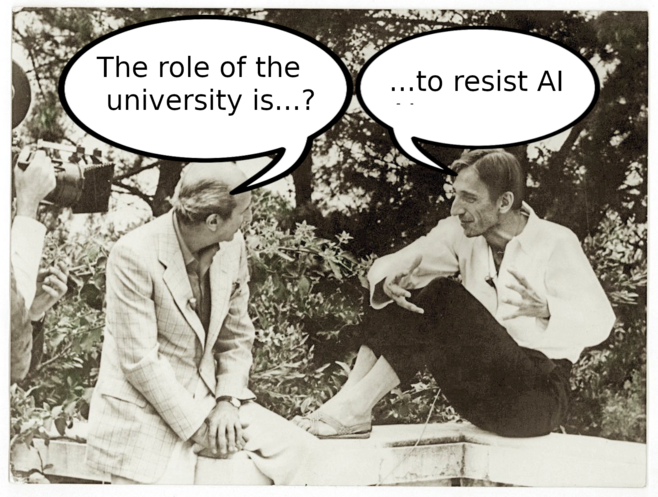Tobacco exposure killed more than 7m people in 2023, study finds
"Some countries have experienced dramatic rises, the researchers said, with the highest jump in #Egypt where deaths in 2023 were 124.3% higher than in 1990."
| Website | https://solarchemist.se |
| ORCID | https://orcid.org/0000-0001-6717-0408 |
| Linkblog | https://links.solarchemist.se |
| Github | https://github.com/solarchemist |
Tobacco exposure killed more than 7m people in 2023, study finds
"Some countries have experienced dramatic rises, the researchers said, with the highest jump in #Egypt where deaths in 2023 were 124.3% higher than in 1990."
«DOGE has provided a template for complete political and cultural rollback, exploiting AI's brittle affordances to trash any pretence at social contract. What the so-called educational offers from AI companies are actually doing is a form of cyberattack, building in the pathways for the hacker tactic of 'privilege escalation' to be used by future threat actors, especially those from a hostile administration.»
"The role of the University is to resist" by @danmcquillan
The Royal Society of Chemistry (#RSC) just issued a vague and puzzling statement about its plans.
https://www.rsc.org/news/our-evolving-approach-to-open-access
It once planned to convert all its journals to #OpenAccess by 2028. By which it apparently meant #APC-based OA. But after talking with customers in different parts of the world, it learned that some regions "are not yet ready for fully OA." By which it means APC-based OA. "The resounding message we heard over and over is that one size cannot fit all." By which it means that not all can pay APCs.
"It became clear that we needed to adapt our vision for openness to account for a landscape that is increasing in complexity and no longer coalescing around a single direction for open research." As if the global landscape had ever coalesced around support for APCs.
But RSC is still committed to some kind of transition to OA. "We are now shaping our future OA approach to support authors in ways that suit them best in a local context."
If it plans to support no-APC forms of OA, it carefully avoids saying so. It never mentions #GreenOA and never endorses #DiamondOA. (It mentions one diamond OA initiative in Africa, but it's not an RSC initiative.)
I'm guessing that it plans to rely on locally customized #ReadAndPublish agreements. (I've argued that all such agreements use APCs in disguise.) But if so, why not say so? If it has other models in mind for regions "not ready" for APC-based OA, why not say what they are?
New blog post: "Why computational reproducibility matters"
https://blog.khinsen.net/posts/2025/06/20/computational-reproducibility.html
This is your yearly reminder that anyone who publishes CS papers should have a personal website that lists their current position, research interests, publications, and email address.
If you don't, it's basically impossible for me to invite you to a PC, invite you to give a talk, ask a question about your work, or recommend you to others when asked.
And it shows how 'open source' is 'corporate-friendly' rather than protecting the interests of the people. We need *copyleft* everywhere. If it can be made proprietary, it's is to society's detriment, not benefit. https://davelane.nz/proprietary
We need to remember that corporations are - structurally, based on all their incentives - the enemy of the rest of us: society, in general. They need to be sapped of their power.
Do you know a better way to embed a table from a quarto notebook into a quarto manuscript? I came up with this hack that works for Markdown-formatted tables and renders normally in both HTML and PDF https://links.solarchemist.se/shaare/cYTC2g
I have a Quarto project of manuscript type with notebooks that generate tables and figures. And I would like to include specific tables from any notebook in the main manuscript index.qmd. In tackling this question I was constrained by the following factor: never {{< include ... >}} a notebook
